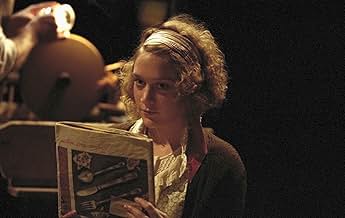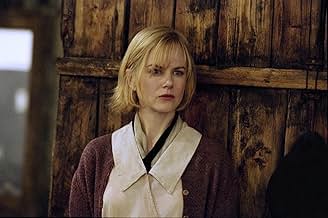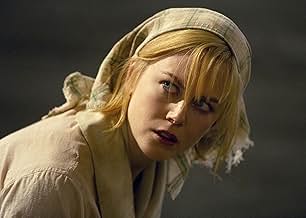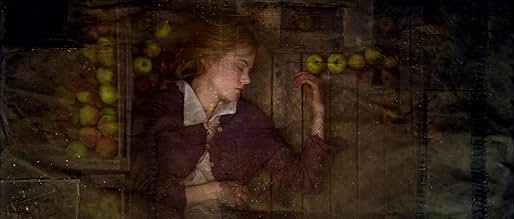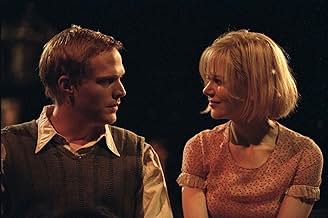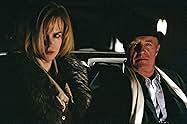Uma mulher que foge da máfia é relutantemente aceita em uma pequena cidade no Colorado. Em troca, ela concorda em trabalhar para eles. Quando uma pesquisa visita a cidade, descobre que seu s... Ler tudoUma mulher que foge da máfia é relutantemente aceita em uma pequena cidade no Colorado. Em troca, ela concorda em trabalhar para eles. Quando uma pesquisa visita a cidade, descobre que seu suporte tem um preço. No entanto, seu segredo perigoso nunca está longe.Uma mulher que foge da máfia é relutantemente aceita em uma pequena cidade no Colorado. Em troca, ela concorda em trabalhar para eles. Quando uma pesquisa visita a cidade, descobre que seu suporte tem um preço. No entanto, seu segredo perigoso nunca está longe.
- Prêmios
- 21 vitórias e 33 indicações no total
Avaliações em destaque
Initially I found the 'play' set-up gimmicky and disconcerting, however I soon forgot all about the framing and became fixated on the picture itself. There are no special effects nor camera tricks and make-up is kept to a bare minimum, which allows us to focus purely on the story and the quality of the acting; both of which are exemplary. Nicole Kidman is amazing as usual bringing a wonderful vulnerability and frailty to her character which conceals an underlying ruthlessness and brutality. Ample support comes from co-stars Betthany and Chloe Sevigny and in truth the whole cast is frighteningly convincing.
The story is simple, a young woman who it appears is on the run from the mob seeks refuge in a small town known as Dogville. The residents who are initially wary of her soon warm to her and welcome her into their midst. This however, comes with a price she must do small favours in return for refuge. Inevitably greed, desire and mistrust take over the residents which corrupts them and has devastating consequences for all involved.
The dramatic shift in the mentality of the townspeople is so well handled and expertly crafted by Von Trier, that it makes the emotional payoff which one receives at the end of this film even greater. It is utterly compelling and has universal themes. Ultimately, this is a film which may serve as a cautionary tale for all self-proclaimed 'civilised' societies and as a treatise upon karmic retribution.
The story is simple, a young woman who it appears is on the run from the mob seeks refuge in a small town known as Dogville. The residents who are initially wary of her soon warm to her and welcome her into their midst. This however, comes with a price she must do small favours in return for refuge. Inevitably greed, desire and mistrust take over the residents which corrupts them and has devastating consequences for all involved.
The dramatic shift in the mentality of the townspeople is so well handled and expertly crafted by Von Trier, that it makes the emotional payoff which one receives at the end of this film even greater. It is utterly compelling and has universal themes. Ultimately, this is a film which may serve as a cautionary tale for all self-proclaimed 'civilised' societies and as a treatise upon karmic retribution.
Just awesome! First, the quasi-theatrical film adaptation with only one stage set... one is amazed at how well this works. In my opinion it is even more effective this way than with a conventional film adaptation.
The story itself is a brilliant lesson in human behavior.
The story itself is a brilliant lesson in human behavior.
Dogville is a small mountain village outside of George Town; it is a tight community of good people who look after each other. However Tom, the town's writer and moral heart feels that the people are not caring deep down. He has the opportunity to test this theory when a woman, Grace, stumbles into the village to escape gangsters. He challenges them to hide Grace and take her in - and is pleasantly surprised as they gradually do. In return she agrees to do work for the villagers - however the relationship begins decreasingly pure and increasingly exploitative.
I have a natural dislike for films that come across as pretentious or arty for art's sake, so you can imagine I approached this film with slight trepidation despite not having seen any clips of it. However, I did really like the film and was surprised just how quickly the three hours flew by. In terms of the plot, it is more than up to the task of the three-hour running time - in fact I (and most of the audience) stayed in my seat until the very last credit had run over great photographs and the great Bowie's `Young Americans'. The plot is good enough to be accepted but you do need to see past the script and look at what it is saying to appreciate it - although having said that it would still grip me even if it hadn't made me think.
Leaving the cinema I felt that I hadn't really bought the film's moral that nobody is really `good' because I felt that most people are not bad, and certainly not to this extent; but I think my mind was stuck on the specifics of the film rather than the meaning. In the film everyone is socially polite and restrained, but once the chance to take advantage comes, it is increasingly taken (albeit to extremes). I felt the film was particularly harsh to Tom, who was actually a `good' person - however I think time has allowed me to understand it better. We are not good people. We do take advantage of others, whether it be individuals (while trying to keep up our good public image as much as we want) or groups. Even those who turn a blind eye are `bad' simply because they could have acted for good and they didn't.
I saw this film two weeks after illegal immigrants drowned in the UK while picking cockles for very, very low wages - they were caught in mudflats by the rising tide. While the obvious `bad' people are those who made them work like this, many others knew of the work and ignored it. More pertinently to the film is the fact that a vulnerable and needy group were exploited by society - just as Grace was here. I didn't get the photographs over the end credit (I was into the music!) but they were all of the poor or minorities etc on the fringe of society - I found this challenging. When many of us see people in need we will do enough to look `good' and keep our social niceties (ie put a £ in the cup) just like those in Dogville did. We all feel good after this, but this film challenges that idea of `good' as wholly inadequate and that just being polite and moving on is still `bad' even if it is on a sliding scale. This is not to say that the film's plot and themes are perfect, but even flawed they are clear and will keep you thinking of the film long after it ends.
Of course it is unrelentingly bleak for the entire second half, but this is the film and I had to accept it for what it was. In terms of being arty, I found the bleak stage to work very well. The only downside of it was cuts from very black scenes to white scenes hurt my eyes in the cinema. This is not just theatre being filmed, the film uses the lack of scenery well. Sure it focuses the attention on the actors, but it also highlights how the people turn a blind eye. In my favourite shot, a rape occurs in one `house' and the camera shoots it through all the others, they are unable to hide from it even if they don't look - it is a very simple way of showing the audience that everyone knows but is socially polite. The film still uses makeup and props except for, inexplicably, Nicole Kidman herself. She starts the film looking good but ends it looking as good - when really she would have looked tired or bedraggled and destroyed.
In fairness Kidman manages to do that without makeup and her performance is very good throughout the film - it is easy to dismiss hers and the other stars' roles as some sort of justification of themselves as `real artists' but it was still a brave move for a business that is more about dollars than art. The rest of the cast more than match her and I was surprised to see so many big names. Bettany is very good as are Bacall, Hall, Ivanek, Sevigny and Skarsgård. Even the child actor is very self-assured and Hurt's homely narration is colourful and funny. Ironically the two black characters have little to do - the script says they are there as a token indication of Edison Sr's open-mindedness, but it is almost like they were token at times - sadly Shims' whole contribution is going `shhhh' twice! Despite that there are no weak links, the acting is superb and it certainly appears as if von Trier's aim of stripping the film away to focus on performances has paid off in a big way. Acting awards may not come but I have not seen more daring performances from a Hollywood cast for quite a while.
Overall this is a bleak and challenging film - not only to watch but to think about and apply to myself too. I left the cinema enjoying it but disagreeing with it's moral point of view, however I allowed myself to look and I now agree with it, as sad as that sounds. As a story and a film it is wonderful; the fact that it has come to the multiplexes' forcing thought and emotion is even better. The saddest thing is that so many teenagers at the screening I was in walked out - they saw something they were not used to and they rejected it within 30 minutes; I find that horribly depressing.
I have a natural dislike for films that come across as pretentious or arty for art's sake, so you can imagine I approached this film with slight trepidation despite not having seen any clips of it. However, I did really like the film and was surprised just how quickly the three hours flew by. In terms of the plot, it is more than up to the task of the three-hour running time - in fact I (and most of the audience) stayed in my seat until the very last credit had run over great photographs and the great Bowie's `Young Americans'. The plot is good enough to be accepted but you do need to see past the script and look at what it is saying to appreciate it - although having said that it would still grip me even if it hadn't made me think.
Leaving the cinema I felt that I hadn't really bought the film's moral that nobody is really `good' because I felt that most people are not bad, and certainly not to this extent; but I think my mind was stuck on the specifics of the film rather than the meaning. In the film everyone is socially polite and restrained, but once the chance to take advantage comes, it is increasingly taken (albeit to extremes). I felt the film was particularly harsh to Tom, who was actually a `good' person - however I think time has allowed me to understand it better. We are not good people. We do take advantage of others, whether it be individuals (while trying to keep up our good public image as much as we want) or groups. Even those who turn a blind eye are `bad' simply because they could have acted for good and they didn't.
I saw this film two weeks after illegal immigrants drowned in the UK while picking cockles for very, very low wages - they were caught in mudflats by the rising tide. While the obvious `bad' people are those who made them work like this, many others knew of the work and ignored it. More pertinently to the film is the fact that a vulnerable and needy group were exploited by society - just as Grace was here. I didn't get the photographs over the end credit (I was into the music!) but they were all of the poor or minorities etc on the fringe of society - I found this challenging. When many of us see people in need we will do enough to look `good' and keep our social niceties (ie put a £ in the cup) just like those in Dogville did. We all feel good after this, but this film challenges that idea of `good' as wholly inadequate and that just being polite and moving on is still `bad' even if it is on a sliding scale. This is not to say that the film's plot and themes are perfect, but even flawed they are clear and will keep you thinking of the film long after it ends.
Of course it is unrelentingly bleak for the entire second half, but this is the film and I had to accept it for what it was. In terms of being arty, I found the bleak stage to work very well. The only downside of it was cuts from very black scenes to white scenes hurt my eyes in the cinema. This is not just theatre being filmed, the film uses the lack of scenery well. Sure it focuses the attention on the actors, but it also highlights how the people turn a blind eye. In my favourite shot, a rape occurs in one `house' and the camera shoots it through all the others, they are unable to hide from it even if they don't look - it is a very simple way of showing the audience that everyone knows but is socially polite. The film still uses makeup and props except for, inexplicably, Nicole Kidman herself. She starts the film looking good but ends it looking as good - when really she would have looked tired or bedraggled and destroyed.
In fairness Kidman manages to do that without makeup and her performance is very good throughout the film - it is easy to dismiss hers and the other stars' roles as some sort of justification of themselves as `real artists' but it was still a brave move for a business that is more about dollars than art. The rest of the cast more than match her and I was surprised to see so many big names. Bettany is very good as are Bacall, Hall, Ivanek, Sevigny and Skarsgård. Even the child actor is very self-assured and Hurt's homely narration is colourful and funny. Ironically the two black characters have little to do - the script says they are there as a token indication of Edison Sr's open-mindedness, but it is almost like they were token at times - sadly Shims' whole contribution is going `shhhh' twice! Despite that there are no weak links, the acting is superb and it certainly appears as if von Trier's aim of stripping the film away to focus on performances has paid off in a big way. Acting awards may not come but I have not seen more daring performances from a Hollywood cast for quite a while.
Overall this is a bleak and challenging film - not only to watch but to think about and apply to myself too. I left the cinema enjoying it but disagreeing with it's moral point of view, however I allowed myself to look and I now agree with it, as sad as that sounds. As a story and a film it is wonderful; the fact that it has come to the multiplexes' forcing thought and emotion is even better. The saddest thing is that so many teenagers at the screening I was in walked out - they saw something they were not used to and they rejected it within 30 minutes; I find that horribly depressing.
Dogville is long, and if you don't have the patience for a slow ramp-up of tension, it'll turn you right off. There are a couple story devices Von Trier uses that really bugged me, and I almost shut it off once. I'm glad I stuck with him, though, because he really took it somewhere and I came away really enjoying the experience..
Critics who hated Dogville talk about it's hamhanded anti-American slant (Lars von Trier refuses ever to set foot in that country). I knew nothing about this film or Von Trier before seeing it and I have to say I entirely missed the anti-America thing until the backcredits. Don't get me wrong, there are several scenes that make commentary about rampant nationalism, prejudice towards immigrants and small town xenophobia, but those comments could be made about the zealous in ANY region of ANY nation at ANY time.
If we are to criticize 21-st Century America, and there are plenty of reasons to criticize it, we must also criticize other peoples and governments who are screwing up royally. I think if Dogville has a point to make to America, its not that it is uniquely problematic, but that it is as problematic as any other nation. Where on this planet can you NOT find a group of people who think:
THE WORLD WOULD BE A BETTER PLACE IF EVERYONE WAS JUST LIKE US.
That statement is the kernel of failure for every major conqueror and every major religion in history and it portends the long, inevitable swirl down the toilet and the people who want you toppled have only to sit back and watch you do it to yourself.
America is a great nation, with a lot of culture, history and art to be proud of, and maybe that's why modern artists feel the need to make pieces like Dogville. To remind America that, as great as it is, it's still a nation of crying, barfing, excreting, whining, greedy, worried, scared mouths to feed, just like the rest of us -- no better or worse.
That's all I think Dogville does as an anti-American piece. If Von Trier meant to just poo on America, he missed his mark and ended up making a point about all of us. Regardless, he among many others wants America to change it's mind about itself, and it doesn't matter if he hates it or loves it. Much more interesting to me is the blatantly obvious point Dogville makes -- to what point do you forgive the transgressions upon you by others who may be less fortunate but are nonetheless doing wrong? It sure made me take a look at my own pacifism.
Nicole Kidman was brilliant, as was Paul Bettany and the simpler townsfolk who will play so skillfully with your emotions. It seems I've been flooded with Kidman movies regularly for a couple weeks now and this is my favourite of her performances.
Good film, Dogville.
Critics who hated Dogville talk about it's hamhanded anti-American slant (Lars von Trier refuses ever to set foot in that country). I knew nothing about this film or Von Trier before seeing it and I have to say I entirely missed the anti-America thing until the backcredits. Don't get me wrong, there are several scenes that make commentary about rampant nationalism, prejudice towards immigrants and small town xenophobia, but those comments could be made about the zealous in ANY region of ANY nation at ANY time.
If we are to criticize 21-st Century America, and there are plenty of reasons to criticize it, we must also criticize other peoples and governments who are screwing up royally. I think if Dogville has a point to make to America, its not that it is uniquely problematic, but that it is as problematic as any other nation. Where on this planet can you NOT find a group of people who think:
THE WORLD WOULD BE A BETTER PLACE IF EVERYONE WAS JUST LIKE US.
That statement is the kernel of failure for every major conqueror and every major religion in history and it portends the long, inevitable swirl down the toilet and the people who want you toppled have only to sit back and watch you do it to yourself.
America is a great nation, with a lot of culture, history and art to be proud of, and maybe that's why modern artists feel the need to make pieces like Dogville. To remind America that, as great as it is, it's still a nation of crying, barfing, excreting, whining, greedy, worried, scared mouths to feed, just like the rest of us -- no better or worse.
That's all I think Dogville does as an anti-American piece. If Von Trier meant to just poo on America, he missed his mark and ended up making a point about all of us. Regardless, he among many others wants America to change it's mind about itself, and it doesn't matter if he hates it or loves it. Much more interesting to me is the blatantly obvious point Dogville makes -- to what point do you forgive the transgressions upon you by others who may be less fortunate but are nonetheless doing wrong? It sure made me take a look at my own pacifism.
Nicole Kidman was brilliant, as was Paul Bettany and the simpler townsfolk who will play so skillfully with your emotions. It seems I've been flooded with Kidman movies regularly for a couple weeks now and this is my favourite of her performances.
Good film, Dogville.
Tough. Once again Lars von Trier tortures the audience (as he did previously on Dancer in the Dark) by upraising the darkest side of the human being. From the beginning you know that things can only get worse, but I doubt that one can figure out neither what's to come nor the powerful conclusion. Nicole Kidman's interpretation is perfect - intense, poignant, passionate, you name it. She is fantastic and so is the small cast locked inside Dogville's scenario (a wonderful creation - I wonder how something so simple can bring such a strong effect). Again, the entire cast is fantastic and for that goes an extra credit for Lars von Trier. His capability of pushing actors to the limit and extracting painful emotions from them creates a heavy atmosphere, full of tension and, at the same time, so familiar. It is not that Dogville represents the essence of our communities, but it exposes some aspects of our lives that we prefer to hide under the carpet.
Você sabia?
- CuriosidadesPaul Bettany didn't want to play Tom Edison, because they were shooting it in Sweden. Then his friend Stellan Skarsgård told him that Lars von Trier's shoots were so funny, that "you'll miss something extraordinary if you turn the part down." After shooting half the movie, Bettany asked Skarsgård when the fun would start, to which Skarsgård replied: "I lied. I did it because he is amazing to work with, and you wouldn't be able to see that before you were actually here yourself. I wanted to give you a chance, and you wouldn't have shown up if I had been frank with you."
- Erros de gravaçãoJack refers to the steeple casting a shadow which touches the O of the store's open sign at exactly 5 PM each day. This would actually only occur on a few days each year, as the lengths and positions of shadows are constantly changing through the seasons.
- Cenas durante ou pós-créditosClosing credits play over photographs depicting crime and poverty in the United States.
- Versões alternativasTo fit the needs of some local distributors, in Italy among others, assistant director Anders Refn cut a version of Dogville which is about 45 minutes shorter than the original. The version was accepted and approved by director Lars von Trier.
- ConexõesFeatured in Trier, Kidman og Cannes (2003)
- Trilhas sonorasYoung Americans
Written and Performed by David Bowie
Courtesy of RZO Music, Inc.
Published by Chrysalis Music Limited / EMI Music Publishing Limited / RZO Music Limited
[Played over end credits]
Principais escolhas
Faça login para avaliar e ver a lista de recomendações personalizadas
- How long is Dogville?Fornecido pela Alexa
Detalhes
- Data de lançamento
- Países de origem
- Centrais de atendimento oficiais
- Idiomas
- Também conhecido como
- Dogville: Uma Cidade não Muito Longe
- Locações de filme
- Empresas de produção
- Consulte mais créditos da empresa na IMDbPro
Bilheteria
- Orçamento
- US$ 10.000.000 (estimativa)
- Faturamento bruto nos EUA e Canadá
- US$ 1.535.286
- Fim de semana de estreia nos EUA e Canadá
- US$ 88.855
- 28 de mar. de 2004
- Faturamento bruto mundial
- US$ 16.690.617
- Tempo de duração2 horas 51 minutos
- Cor
- Mixagem de som
- Proporção
- 2.35 : 1
Contribua para esta página
Sugerir uma alteração ou adicionar conteúdo ausente




